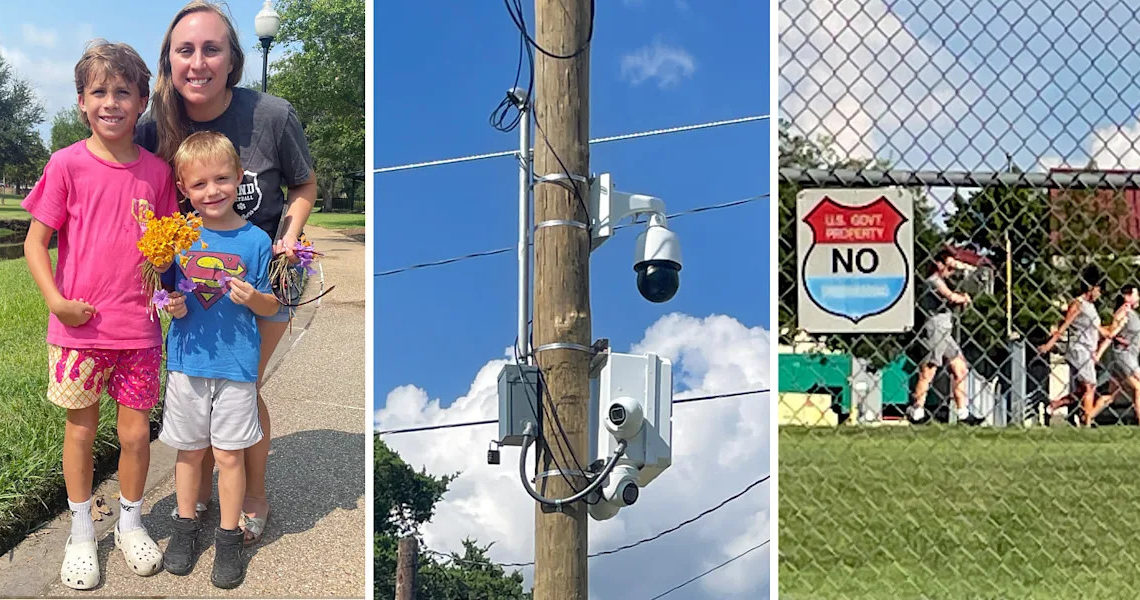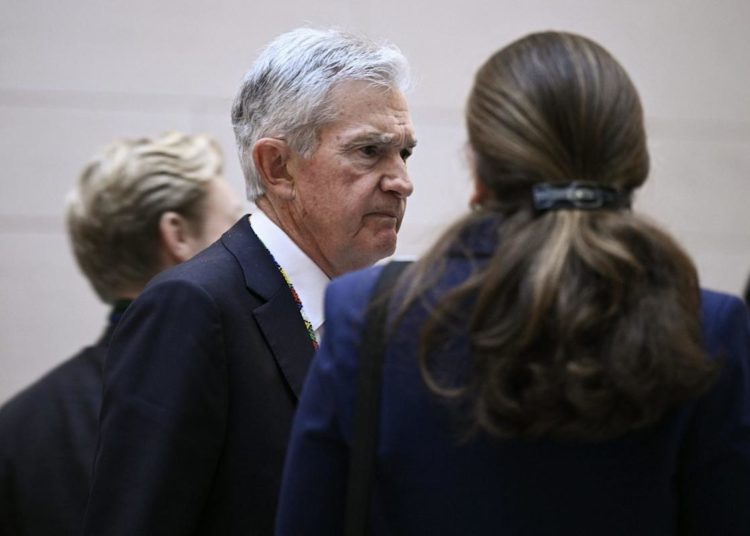BRYAN, Texas — Daisy Perez has lived across the street from the all-women’s prison in her residential community for nine years, forming a careful, if not curious, co-existence with her fenced-in neighbors clad in matching khakis and boots.
The prisoners at Federal Prison Camp Bryan wave to Perez, 42, and her 78-year-old mother while they’re looping around the recreation yard. They wave as they pick up litter along the roadside. On Sundays, Perez sees them with visitors outside, the scene reminiscent to her of families enjoying a carefree day at the park.
The prison is set in a neighborhood of bungalows and craftsman-style homes with well-kept yards and gardens. Mockingbirds, wrens and sparrows flit in and out of crape myrtle trees lining part of the property’s outside perimeter.
“Sometimes my girls say, ‘Man, they got the good music in there,’” Perez said. “You can hear it. It’s loud. … They jam.”
But the casual atmosphere shifted last week when Perez and her neighbors noticed heightened security — armed guards checking cars, patrol vehicles circling the perimeter and surveillance cameras affixed to utility poles — stationed around FPC Bryan. When she turned on the news, it clicked: Ghislaine Maxwell, Jeffrey Epstein’s co-conspirator and confidant, who was convicted of sex trafficking charges involving underage girls, was Bryan’s newest inmate.
“I say that’s crazy,” Perez said. “It’s creepy because a lot of people try to catch her.”
The 91,500 residents of Bryan, a small city about 100 miles northwest of Houston, are used to high-profile inmates calling the low-key prison camp home, often drawing media attention and paparazzi staking out the premises. But the arrival of Maxwell, whose association with Epstein and the baseless conspiracy theories surrounding his suicide in a New York City jail in 2019, has spurred a whole new level of concern for some residents.
Marina Boland, 29, who lives across a highway from the prison, said, “It’s scary to think” that someone would be motivated to come to Bryan in connection with the controversies linked to Epstein, the wealthy financier who had cultivated friendships and relationships with powerful people, from business leaders to presidents.
Boland, who was recently wheeling her two young children in a wagon cart out of Bryan’s downtown library, said Maxwell’s arrival has made locals hypervigilant about who it draws to their town, and in turn, who they speak with — as unfounded internet conspiracies can have real-world consequences.
“People could be out here to cause harm,” Boland said.
Epstein was facing charges of sex trafficking and conspiracy when he killed himself. Maxwell, a socialite and daughter of a British media mogul, was convicted on federal charges in 2021 for her role in helping Epstein recruit and sexually abuse young girls.
In recent weeks, the release of files related to Epstein has become a politically charged debate after the Trump administration said it would not put out all of the documents detailing the federal government’s investigation into him. Maxwell herself returned to the spotlight after it was revealed that Deputy Attorney General Todd Blanche met with her last month for nine hours over two days in a federal courthouse in Tallahassee, Florida.
Details of their discussion have not been made public, but in the days after the meeting Maxwell was transferred from her low-security prison in Florida to minimum-security Bryan. That stoked outrage among some current and former federal Bureau of Prisons employees who question why she would be placed there given her sex offense charges and the higher level of security she requires.
Boland said Maxwell’s presence is detracting from her town, which beckons visitors with the sign, “Welcome to Aggieland,” a reference to Texas A&M University located in neighboring College Station.
“Bryan is a beautiful place and it’s kind of upsetting it’s known for the prison,” said Boland, who originally moved here from Chicago.
She said she is disgusted by Maxwell’s crimes and noted they have placed her in a facility that typically houses nonviolent and white-collar criminals.
“I don’t consider what she did a nonviolent offense,” Boland said.
Other residents questioned why Maxwell — who isn’t slated for release until July 2037, when she would be 75 — would get moved to a prison camp where security has traditionally been lax.
The BOP’s policy indicates she should be ineligible to be housed at a minimum-security prison camp because she is a convicted sex offender.
A sex offender must be in at least a low-level security prison, unless a waiver is granted by the administrator of the BOP’s Designation and Sentence Computation Center. The BOP declined to comment on Maxwell and the security procedures put in place at FPC Bryan.
Maxwell’s transfer “makes me mad,” said Robert, 43, who declined to give his last name but said he owns a home renovation business. Standing attentively by his son while the boy played at a park near FPC Bryan, he said Maxwell’s relocation gives the appearance that people who come from power and influence are being treated differently.
“The punishment does not match her crimes,” he said. “If it was anyone else, definitely that person would get worse punishment.”
Another parkgoer, Ashley Doss, 41, wondered if politics or something else was behind Maxwell’s move.
“It seems like these people that are high profile do get put here, though,” said Doss, while she sat with one of her sons on a bench.
“It’s always surprising to me that our little town is on the map because of our women’s prison here,” she added.
The prison grabbed headlines two years ago when Elizabeth Holmes, the disgraced founder of the blood-testing lab Theranos, arrived to serve her sentence for wire fraud. It was the same year that “Real Housewives of Salt Lake City” star Jen Shah began her sentence for running a telemarketing scheme that targeted elderly victims. In 2020, Hot Pockets heiress Michelle Janavs served a five-month sentence at FPC Bryan for her role in a sweeping college admissions scandal.
Unlike a traditional federal prison, inmates at Bryan are provided more freedoms: They live in dormitory-style housing with no locked doors. They can mingle in sitting areas between housing units. And they have access to the recreation yard and a hobby and crafts area.
The chain-link fencing topped with a strand of coiled barbed wire and a section of decorative iron bar fencing surrounds the 37-acre compound, but it’s not unheard of for inmates to occasionally walk off the premises before being forced back.
“It’s not a facility where you see guard dogs walking around and a whole bunch of concertina wire,” said Bryan Councilman Ray Arrington, whose district includes the prison. “It’s not like that. It looks like a school.”
On Thursday night, neighbors noticed a new feature at the prison: a mesh privacy screen was put up along a portion of the fencing, blocking their views. Then on Friday, additional privacy screening was affixed to the fence around the campus, blocking public views of the running path used.
Arrington said he has not personally heard from constituents about Maxwell’s arrival, but he believes local law enforcement and prison security would be able to handle any related threats.
“We don’t have any fears,” Arrington said. “We didn’t have any issues in the past week.”
Residents around FPC Bryan say the change in security is a diversion from the norm.
“They are patrolling for her, not for us,” Marc Ybarra, 22, said from his home across the street from the prison, referring to Maxwell.
Ybarra said it makes sense she would end up in Texas, and in a semi-remote area such as Bryan, to keep her and the controversy surrounding her “hush-hush.”
“It makes for whatever agenda they had, whatever they are trying to push,” added Ybarra’s partner, Mya Lopez, 21. She waved to an inmate who was walking the prison’s jogging path.
On a recent afternoon, Bryan native Angel Castaneda worked with a crew on a driveway and sidewalk of a home across from the prison camp, as armed guards with bulletproof vests and other equipment patrolled around the property.
“They’re 24/7 now,” Castaneda said.
Cars used to be able to drive up to the prison’s entrance and use a scanner to get past a barrier arm, he said, but now, drivers are met by guards.
“Most people have always felt this was safe. It has never really been a problem,” Castaneda said of the prison camp. “They’ve always had everything under control.”
“You’ll hear of a woman escaping every two, three, five years. It’s random,” he said, adding that they usually don’t make it far.
Maxwell’s arrival at the prison does have him concerned, he said, but more so given her status as a sex offender than any conspiratorial association.
“If they have them in custody,” Castaneda said, “it’s probably better that way.”
Suzanne Gamboa reported from Bryan and Erik Ortiz from New York.
This article was originally published on NBCNews.com
The post Ghislaine Maxwell puts an uncomfortable spotlight on this prison camp town in Texas appeared first on NBC News.



